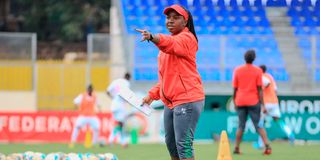It’s time we recognised women coaches as football changemakers

Under-17 girls’ national team head coach Mildred Cheche conducts a training session at Dandora Stadium in Nairobi on May 7, 2024.
What you need to know:
- Their ascension demonstrates that activities that require skills and exposure are gender roles, which are not biologically innate.
- We should hope to see more women in the leadership of sports organisations.
When Talanta Football Club beat Sofapaka by a solitary goal on September 14, this was the first win by a Kenyan men’s premier league team coached by a woman, and one making its debut. Jackline Juma, the Talanta coach, was hired in August 2024, in the wake of coaching the U-20, U-17 and U-15 national female teams as well as Gaspo, Kayole Starlets, Acakora Ladies, Talanta Hela and Gor Maria Queens in the national women’s league.
In an interview after her appointment, Jackline averred that she would “show women that it is possible to compete at the highest level” adding that "this is an achievement not just for me but all the female coaches out there". This statement underlines the power of role modelling and the concept of symbolic consequences - that women in significant positions are seen to be there not only on personal behalf but also that of other women.
But being the only female in the technical bench of men’s league also brings with it the baggage of “loneliness among peers” – absence of people like her for professional company. This often leads to feelings of alienation by the prevailing culture in the new space, as manifested in language, jokes, dressing, social activities and facilities to cater for gender-specific needs.
Rarity also creates impostor syndrome, the feeling that one is in the wrong place being the only person or a member of a minority in a place dominated by members of the opposite sex.
Besides Jackline, there is Mildred Cheche, head coach of the Junior Starlets, which has qualified for the 2024 Under-17 Women’s World Cup. This is the first Kenyan team to qualify for any world cup organised by the International Federation of Association Football. Mildred observes that her success has inspired more girls to venture into playing football. This will definitely solidify should her team win even just one match in the world cup, given the heavyweight teams in its pool namely England, Mexico and North Korea.
Completing the trio is Beldine Odemba whose portfolio straddles Harambee Starlets, Kenya Police Bullets, Rising Starlets and Highway Boys’ Secondary School. She is the first female coach to guide a boys’ football team (Highway) to the final of the East Africa Secondary School games way back in 2022.
She is credited with forming the pioneer girls’ team at Mathare Youth Sports Association, having started off by accompanying her brothers to the game and even playing alongside them. She guided Harambee Starlets to the final round of Women's Africa Cup of Nations qualification and led Kenya Police Bullets to its first Football Kenya Federation Women's Premier League title in the 2023-2024 season, unbeaten and in its debut.
As their profiles show, these women have not suddenly come from nowhere to the pinnacle of soccer. Thus Beldine states, “I have worked to get to where I am.” This resonates with Jackline who attributes success to “hard work … dedication … a lot of sacrifice, effort and diligence”.
Beldine envisions the transformation of the Kenyan Women's Premier League into a professional competition from which players can earn a living. Like Jackline, she also sees herself as a role model for other women, especially those who wish to become football coaches.
All these women have solid technical credentials required for their jobs, namely the Confederation of African Football licences A for Jackline and Beldine, and B for Mildred. In Jackline’s words, “female coaches should not shy off from taking these classes and getting their licenses." She also emphasises that “gender should not be a barrier”, an inspiration for anyone aspiring for success. This is echoed by Beldine, that women in football should focus on “their abilities as players and coaches, and not their gender”.
The ascension of these women demonstrates that activities which require skills and exposure, such as coaching, are gender roles which are not biologically innate. It illustrates a positive attitude towards women by the teams appointing them and the players they are handling. It also underlines that women do not always have to rely on affirmative action.
But even as we celebrate the three, we should hope to see more women in the leadership of sports organisations. The media should also desist from slugging – focusing on their appearance, attire and family life rather than profession - when covering them. This already occurred in one article titled “Power to the girlies” after Jackline’s appointment, and another referring to the motherhood of Beldine. These women should also not be treated as intruders in a masculine turf. Their stories add to those of female soccer coaches in other countries. But that is a story for another day.
The writer is a lecturer in Gender and Development Studies at South Eastern Kenya University ([email protected]).





